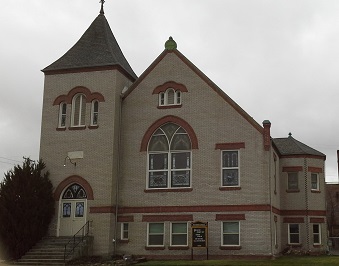1 Thus the Lord GOD showed me: behold, a
basket of summer fruit. 2 And he said,
"Amos, what do you see?" And I said, "A basket of summer
fruit." Then the LORD said to me, "The end has come upon my people
Israel; I will never again pass by them. 3 The songs of the temple shall become wailings in that
day," says the Lord GOD; "the dead bodies shall be many; in every
place they shall be cast out in silence." 4 Hear this, you who trample upon the needy, and bring the poor
of the land to an end, 5
saying, "When will the new moon be over, that we may sell grain? And the
sabbath, that we may offer wheat for sale, that we may make the ephah small and
the shekel great, and deal deceitfully with false balances, 6 that we may buy the poor for silver and
the needy for a pair of sandals, and sell the refuse of the wheat?" 7 The LORD has sworn by the pride of
Jacob: "Surely I will never forget any of their deeds. 8 Shall not the land tremble on this
account, and every one mourn who dwells in it, and all of it rise like the
Nile, and be tossed about and sink again, like the Nile of Egypt?" 9 "And on that day," says the
Lord GOD, "I will make the sun go down at noon, and darken the earth in
broad daylight. 10 I will
turn your feasts into mourning, and all your songs into lamentation; I will
bring sackcloth upon all loins, and baldness on every head; I will make it like
the mourning for an only son, and the end of it like a bitter day. 11 "Behold, the days are
coming," says the Lord GOD, "when I will send a famine on the land;
not a famine of bread, nor a thirst for water, but of hearing the words of the
LORD. 12 They shall wander
from sea to sea, and from north to east; they shall run to and fro, to seek the
word of the LORD, but they shall not find it.
15 He is the image of the invisible God, the
first-born of all creation; 16 for in him
all things were created, in heaven and on earth, visible and invisible, whether
thrones or dominions or principalities or authorities--all things were created
through him and for him. 17
He is before all things, and in him all things hold together. 18 He is the head of the body, the
church; he is the beginning, the first-born from the dead, that in everything
he might be pre-eminent. 19
For in him all the fulness of God was pleased to dwell, 20 and through him to reconcile to
himself all things, whether on earth or in heaven, making peace by the blood of
his cross. 21 And you, who
once were estranged and hostile in mind, doing evil deeds, 22 he has now reconciled in his body of
flesh by his death, in order to present you holy and blameless and
irreproachable before him, 23
provided that you continue in the faith, stable and steadfast, not shifting
from the hope of the gospel which you heard, which has been preached to every
creature under heaven, and of which I, Paul, became a minister. 24 Now I rejoice in my sufferings for
your sake, and in my flesh I complete what is lacking in Christ's afflictions
for the sake of his body, that is, the church, 25 of which I became a minister according to the divine
office which was given to me for you, to make the word of God fully known, 26 the mystery hidden for ages and
generations but now made manifest to his saints. 27 To them God chose to make known how great among the
Gentiles are the riches of the glory of this mystery, which is Christ in you,
the hope of glory. 28 Him
we proclaim, warning every man and teaching every man in all wisdom, that we
may present every man mature in Christ. 29 For this I toil, striving with all the energy which he
mightily inspires within me.
38 Now as they went on their way, he entered
a village; and a woman named Martha received him into her house. 39 And she had a sister called Mary, who sat at the Lord's feet
and listened to his teaching. 40
But Martha was distracted with much serving; and she went to him and said,
"Lord, do you not care that my sister has left me to serve alone? Tell her
then to help me." 41
But the Lord answered her, "Martha, Martha, you are anxious and troubled
about many things; 42 one
thing is needful. Mary has chosen the good portion, which shall not be taken
away from her."
